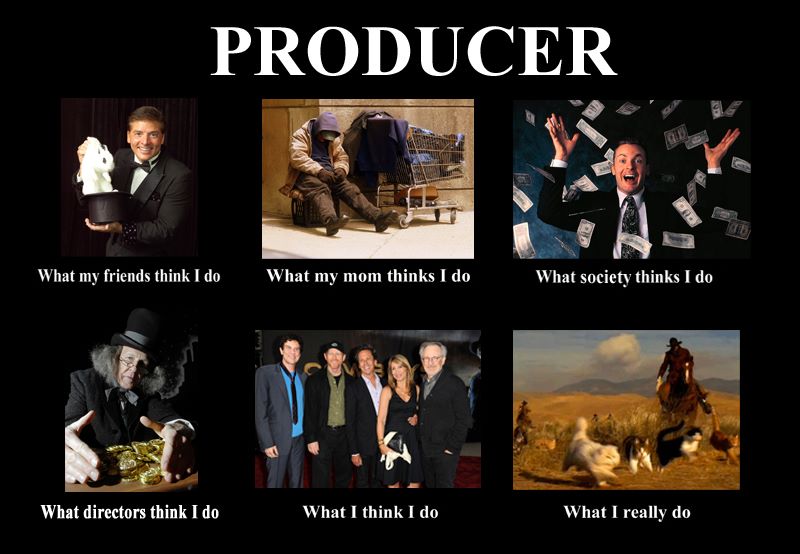 |
| This image is so 6 months ago |
This is extremely difficult to answer and it seems no one really knows. The title changes from studio to studio. Most often in interviews for a producer role, I am usually asking that studio what does a producer role mean in this office. It’s a bit of an anomaly. Designers, artists, and programmers have a sense of familiarity and process of the daily grind as they move from job to job. And the life of anyone in entertainment tends to be very gypsy-like as projects begin and end or studios open and shutter. But producers are enigmas. We can sense each other and share in the pains and processes, but for the most part we are in the roles that don’t actually make anything, so it is rather tough to say what is it that you actually do as a producer. Much like the definition of what a game is, I’ve heard various descriptions during my time, but none of them really fully explain the job. “Producers are the net that catch all the spinning plates and if a plate falls, they put it back on the stick.” “Producers are the cattle prod behind all developers.” “Producers are a carrot on the stick and a boot in the butt.” “Producers make pretty spreadsheets and let us know how far behind we are.” “Producers are annoyances that stop by desks and remind you how stressed you are.” “Producers get the best desks, the second largest paychecks, and figure out how everything is going to be completed.”
For the last 6 years of doing my job, I still have a very hard time describing what it is that I do. Then I was faced with a home repair job that felt very much like what I dealt with day-to-day and I believe becomes an excellent metaphor for game production.
At around 3am on a weekday night (which is when all home catastrophes happen) I awoke to find a non-trivial amount of water in my kitchen. Since this was 3am, everything moved forward in my brain in slow motion as I connected the pieces while scanning the kitchen through only one open, yet bleary eye. Though it took an age to figure out without the help of caffeine, the mystery of the new lake in my kitchen turned out to be the result of a leaky pipe and my dishwasher water now emptying out everywhere except the pipe it was meant to go through.
 |
| My expertise in plumbing came from TV. So I beat my head with a pipewrench and jammed a finger into my eye. |
I mopped up the water before it caused any damage while spilling out a litany of curses strung together in a tapestry of colorful expression ranging from the obtuse to just plain rambling. A coffee and flashlight later, I found a fragged P-trap under my sink that was letting out all of the water. Once I had removed the problem piece, I was faced with an unusual problem: how do I fix this mess?
My home is a century old. No, literally. It was built just before the Titanic set sail. Much of the construction of my house is new tech over old tech. You can make out where the coal used to be shoveled in from the driveway. The electric is a bizarre series of systems rather than room-by-room (one breaker controls lights in the kitchen, hallway, dining room, master bed room, and guest room, but nothing else). Much of the basic structure of the house was built in a time when there was no set standards and many things were built by hand with what was available nearby. This was the case with my sink drain.
From the floor I had a steel pipe sticking straight up at a non-standard width. Clearly this had been around since the Downton Abbey days. Coming down from the sink was a modern steel pipe of standard size. And this two pipes were about two-feet apart from each other.
 |
| Skype?! But how will it replace my complex system of pull-string bells? |
Once I had arrived at the Home Depot (which opens extremely early for contractors and home owner catastrophes) I realized an additional dilemma. All modern P-traps are made of plastic. I needed to go from steel to plastic and back again, spanning across the inside of my cabinet while all connections being watertight and letting gravity do the work.
This is where the production part kicks in. As a producer, you are the first one to take a step back and evaluate the situation. It does not matter whether you are creating a new innovation in gaming or you are just polishing a game feature in Madden '13 that has existing since Madden '88, you will be faced with something where there is a significant translation problem, and the piece to fix it is not ideal. Nearly every dev can create solutions, but it is up to the producer to find the optimal solution. Fixing a sink may not have any effect on the electric, but in a game system it very well could be connected.
 |
| Someone in Tiburon is coding a Turkey Leg feature. This man knows what I'm talking about. |
The producers job is the get everything from the sink to the drain in the fastest, cheapest, and best possible way, even if that solution is ugly as hell. A producer does not necessarily do the fix him/herself, but they should be familiar enough with every other working piece that they can make calls and suggestions for the developer to get the fix in right the first time. If they were good enough, they saw the problem before anyone else and had all the parts ready for when that day came. Producers are planners, translators, and problem-solvers. They excel when they are presented with a situation that there is no set process and they need to make something impossible happen. No one tells you how you are going to produce a Game with Fame event with Slipknot while they are in tour in Tokyo and your are in Manhattan, but as a producer you figure it all out.
 |
| Nice guy and a Frontlines fan. Who knew? |
What I purchased from the Home Depot that morning was a bizarre collection of parts that formed together into a MacGyvered interpretation of a P-trap. It worked flawlessly and I still had time to eat breakfast and go to work on time. To this day I have not had a single drop of water come out of this system, so for the time-being, I do not have to deal with swimming in my kitchen.



No comments:
Post a Comment